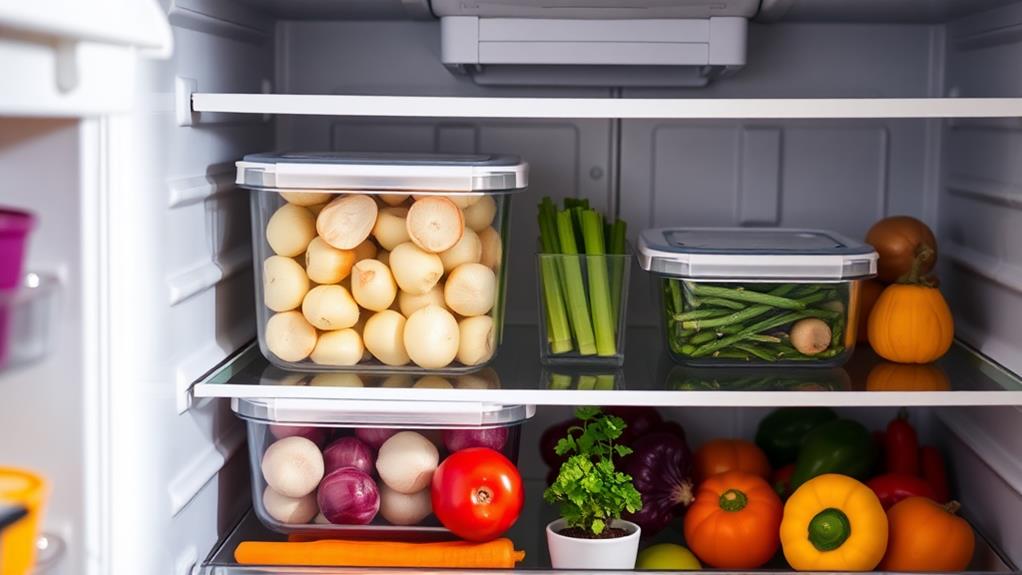To store cut onions and veggies frugally, use airtight containers or repurpose glass jars, like mason jars, to keep them fresh. Wrap onions in plastic wrap or place them cut-side down to minimize odor and exposure. Make sure to label containers with the date to track freshness. For greens, use paper towels to absorb excess moisture and keep them crisp. Implement odor control by placing an open container of baking soda in your fridge. Regularly check for spoilage to avoid waste. Want to discover more tips for maximizing freshness and minimizing waste? Keep exploring!
Best Practices for Onion Storage
When it comes to storing onions, following some best practices can make a big difference in keeping them fresh. To start, always store your chopped onions in airtight containers or glass jars in the fridge. This method can extend their freshness for up to 7-10 days while minimizing any unwanted odor spread.
Clean and dry the outside of your storage containers, as this helps prevent the transfer of onion odors to other foods in your fridge. Additionally, utilizing efficient methods for managing food waste can enhance your overall kitchen organization, similar to how top expense management apps streamline financial oversight.
When you're preparing onions, use a sharp knife. This technique minimizes cell damage, which reduces the release of strong odors during chopping. For even better storage, consider wrapping your chopped onions in plastic wrap or placing them cut-side down in a container. This further reduces exposure to air and minimizes odor release.
If you want to keep your onions for a longer period, freezing diced onions in resealable bags is a great option. This method can extend their shelf life to several months while maintaining their delicious flavor.
Frugal Containers for Cut Onions
Storing cut onions doesn't have to break the bank; plenty of frugal container options can keep them fresh without adding to your expenses. One of the best choices is reusable glass containers, like mason jars. They contain odors effectively while being sustainable and reusable, supporting eco-friendly practices in your kitchen.
If you're looking for something even more budget-friendly, repurpose food containers such as empty yogurt or takeout containers. These options are cost-effective and help you avoid buying new storage solutions, aligning with sustainable packaging solutions.
For a quick fix, zip-top bags or tight-sealing plastic containers can minimize odor escape, and they're often available at low prices or can be reused from previous purchases. If you double-bag your cut onions in zip-top bags, you'll enhance odor containment and make the most of what you already have.
Alternatively, consider a breathable container, like an open mesh basket. This option allows for air circulation, which helps maintain freshness without the need for specialized products.
With these frugal containers, you can keep your cut onions stored efficiently while saving money.
Odor Control Techniques
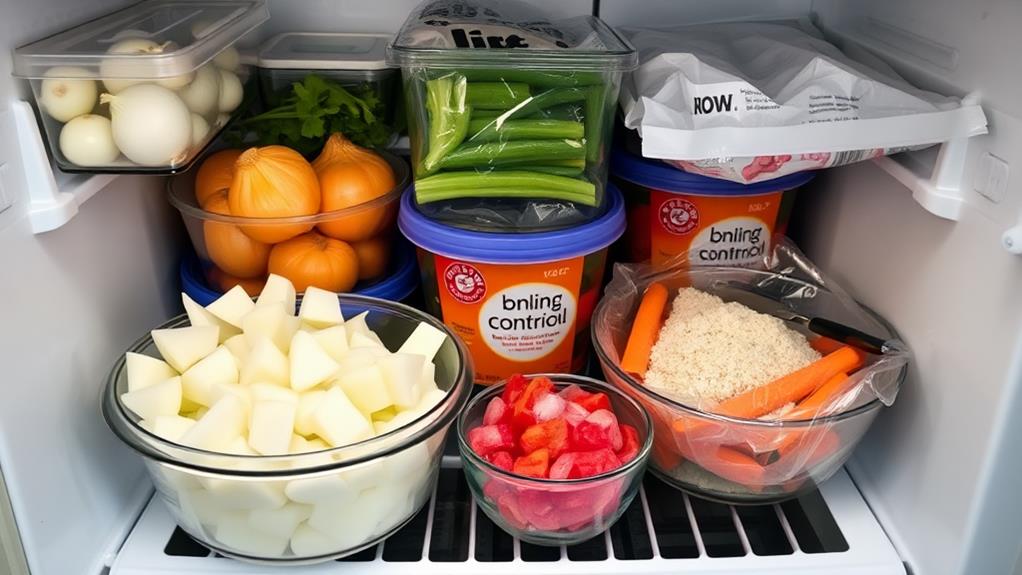
To keep your fridge smelling fresh, try using baking soda to absorb those stubborn odors.
You can also explore vinegar solutions, which effectively neutralize smells and help maintain a pleasant environment for your stored veggies.
Additionally, consider implementing efficient bill tracking tips to streamline your financial organization, as a well-organized kitchen can contribute to an overall harmonious home.
Implementing these odor control techniques will make your kitchen more enjoyable and less pungent.
Baking Soda Absorption
Baking soda's powerful odor-absorbing qualities make it an excellent choice for controlling the strong smells that often accompany cut onions and other veggies. By using this effective odor absorber, you can keep your fridge smelling fresh and your vegetables in top condition.
Here are three simple ways to utilize baking soda for odor control:
- Open Container: Place an open container of baking soda in your fridge. This will neutralize odors from various foods, including cut onions, and help maintain a pleasant environment for your vegetables.
- Sprinkle on Containers: For targeted odor control, sprinkle baking soda directly on the surface of containers holding cut onions. This technique helps absorb any lingering odors released during storage.
- Clean with Baking Soda: If you've stored cut onions in plastic or glass containers, use baking soda to clean them afterward. It effectively neutralizes odors that tend to cling to surfaces.
Remember to replace the baking soda every three months or when it has absorbed odors to guarantee ideal freshness in your fridge.
With these tips, you can enjoy your veggies without the overpowering scent of cut onions!
Vinegar Neutralization Methods
When it comes to keeping your kitchen fresh, vinegar offers a powerful solution for neutralizing onion odors. If you're storing chopped onions, simply soak a cloth or sponge in vinegar and place it inside the storage container. This method effectively absorbs those pungent odors, making your kitchen smell much better.
You can also tackle lingering smells on your hands after handling onions. Just wash them with a mixture of vinegar and water for a quick fix.
If you've stored onions on a surface, don't forget to spray that area with a vinegar-water mixture to neutralize any remaining odors.
To combat unwanted smells in your fridge, placing a small bowl of vinegar inside can work wonders, absorbing odors from stored onions and other strong-smelling foods.
Additionally, rinsing your chopped onions in vinegar before storage can help mitigate the release of sulfur compounds that contribute to those stubborn, pungent odors.
Maximizing Freshness of Vegetables
Often, maximizing the freshness of your vegetables comes down to proper storage techniques. By following these simple tips, you can keep your veggies crisp and flavorful.
Additionally, consider utilizing digital coupons for groceries to save on fresh produce, which can encourage you to buy more vegetables and reduce food waste.
- Store cut onions in airtight containers: This helps extend freshness for up to 7-10 days while minimizing odor transfer to other foods.
- Wrap chopped vegetables tightly: Use plastic wrap or resealable bags to prevent moisture loss and maintain their crispness.
- Use paper towels for leafy greens: Place them inside storage bags to absorb excess moisture, which keeps them fresh for 1-2 weeks.
For hardier vegetables like carrots and bell peppers, keep them in the crisper drawer in breathable bags. This can maximize their shelf life to about two weeks.
It's also vital to regularly check your stored vegetables for spoilage. If you spot any affected items, remove them immediately to prevent decay from spreading to others.
Waste Reduction Strategies
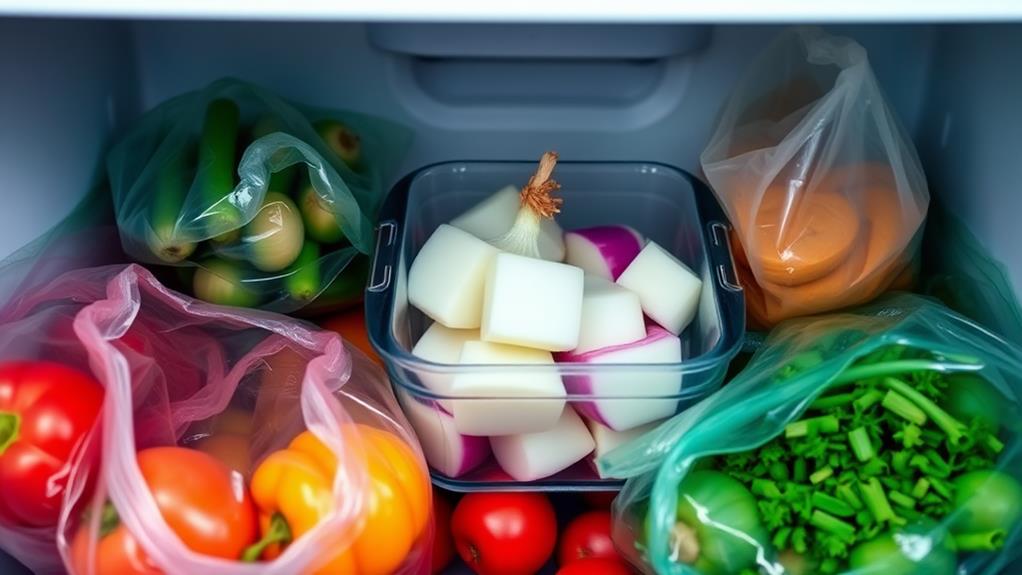
Waste Reduction Strategies
To cut down on waste, consider using reusable storage containers for your veggies and onions.
You can also implement budget tracking tools to help manage food expenses effectively.
Freezing leftovers keeps them fresh for future meals, while composting scraps enriches your garden.
These strategies not only save money but also help you make the most of your food.
Reusable Storage Containers
Using reusable storage containers is a smart choice for anyone looking to reduce waste in the kitchen. By opting for these containers, you not only cut down on plastic but also keep your cut onions and veggies fresh longer.
Here are three effective strategies:
- Airtight Containers: Use airtight containers to store cut onions and other vegetables. They prevent air exposure, reducing moisture loss and extending shelf life.
- Zip-Top Bags: These are perfect for portion control and can be reused, promoting sustainable practices while minimizing food waste. They're especially handy for chopped veggies.
- Double-Bagging: For strong onion odors, consider double-bagging your cut onions in zip-top bags. This strategy keeps your fridge smelling fresh and effectively contains any odors.
Don't forget to label your containers with the date to track freshness!
By incorporating these tips, you'll not only enjoy fresher produce but also embrace sustainable practices that benefit both your kitchen and the environment.
Using reusable storage containers is a simple yet impactful way to make a difference.
Freezing Techniques Explained
While you might think fresh vegetables are best used immediately, freezing them can be a game changer for reducing waste and extending their shelf life. Freezing chopped onions, for instance, allows you to keep them fresh for several months, making meal prep a breeze. To do this, simply spread your chopped onions on a baking sheet in a single layer. Freeze them until solid, then transfer the onions into airtight containers or zip-top bags for long-term storage.
When it comes to freezing other veggies, like peppers, wash and slice them beforehand, and freeze in a single layer just like the onions. This method preserves their flavor for up to six months.
If you're freezing leafy greens like kale or collards, blanching them first stops enzyme activity and helps maintain quality for 6-8 months.
Don't forget to label all frozen containers with the date to track freshness. This way, you can guarantee you use your frozen veggies within their ideal storage time.
Composting Food Scraps
Freezing vegetables is a great way to extend their shelf life, but what about the scraps you leave behind? Instead of tossing those vegetable scraps in the trash, consider composting food scraps to reduce kitchen waste and create nutrient-rich soil.
Here are three compelling reasons to start composting:
- Waste Reduction: Composting can reduce kitchen waste by up to 30%, diverting organic waste from landfills that contribute to methane emissions.
- Soil Health: The compost bin transforms your scraps into nutrient-rich soil, perfect for your garden.
- Easy Setup: Starting a compost system requires minimal investment—just a container or simple pile in your backyard.
To make the most of your composting efforts, balance "green" materials (like vegetable scraps) with "brown" materials (like dried leaves) to achieve the ideal carbon-to-nitrogen ratio.
This not only enhances the composting process but also supports sustainable waste management practices. In just 2-6 months, your food scraps can become a valuable resource for gardening, reducing your kitchen waste while giving back to the earth.
Tips for Storing Leafy Greens
To keep your leafy greens fresh and crisp, store them properly right after you bring them home. Tender salad greens and lettuces should be consumed quickly, so wrap them in paper towels to absorb excess moisture.
For hardier greens like kale and collards, place them in bags with paper towels to maintain airflow; they can last 1-2 weeks in the fridge. Utilizing proper storage techniques can help optimize your food expenses and reduce waste, much like expense tracking tools streamline financial processes for small businesses.
If you want to store chopped onion, make sure it's in an airtight container to avoid the smell spreading to your leafy greens.
It's essential to keep your greens away from ethylene-producing fruits like apples and bananas, as these can accelerate spoilage. Regularly inspect stored leafy greens and remove any spoiled leaves immediately to prevent them from affecting the rest of the batch.
Brassicas, such as Brussels sprouts and cabbage, can last 1-3 weeks if stored correctly, with whole heads maintaining freshness longer than pre-cut ones.
Proper Storage for Root Vegetables
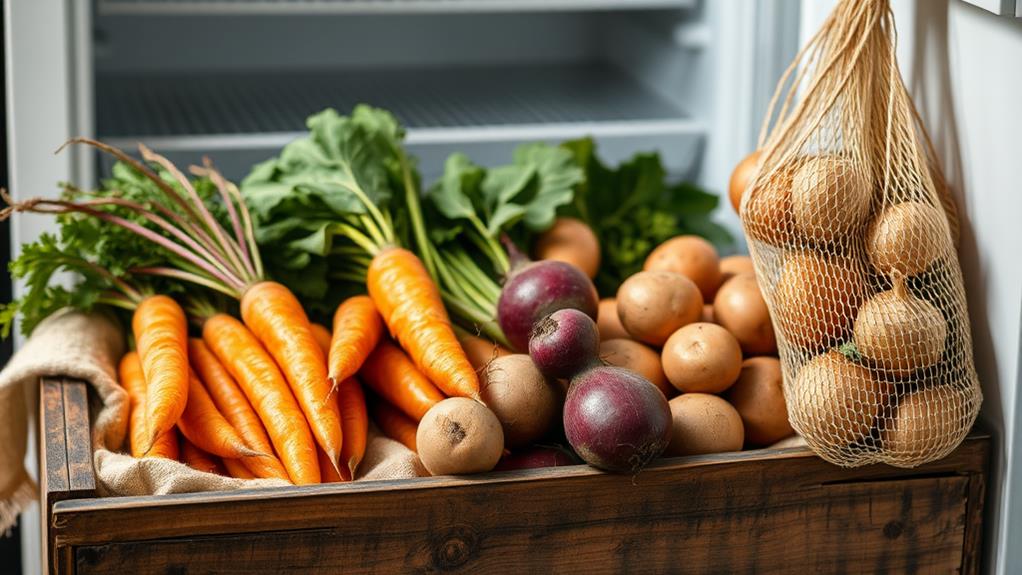
When you want to keep root vegetables like carrots, potatoes, and beets fresh for as long as possible, proper storage is key. Utilizing effective expense tracking tools can help you allocate your budget towards fresh produce.
Here are three essential tips to maximize their shelf life:
- Cool, Dry Place: Store root vegetables in a location with temperatures between 40-50 degrees Fahrenheit, away from sunlight and moisture. This helps minimize spoilage.
- Use the Right Containers: Potatoes and sweet potatoes should go in paper bags to prevent moisture buildup. Carrots can be placed in a plastic storage container with holes or a container filled with damp sand to maintain humidity.
- Inspect Regularly: Check your stored root vegetables often for signs of spoilage, like soft spots or mold. Remove any affected items immediately to prevent the spread of decay.
While non-refrigerated storage works for whole root vegetables, once you chop or peel them, it's best to keep them in an airtight container in the refrigerator.
Use them within a week to enjoy their quality, as exposure to air can introduce harmful chemicals and lead to premature spoilage.
Keeping Peppers and Cucumbers Fresh
To keep your peppers and cucumbers fresh, you need to store them in the right conditions.
Bell peppers and chiles do best in a plastic bag in the fridge, while cucumbers thrive wrapped in paper towels.
Utilizing effective price comparison tools can help you save money on fresh produce.
Ideal Storage Conditions
Keeping your peppers and cucumbers fresh requires some simple yet effective storage techniques. By following these ideal storage conditions, you can enjoy these veggies longer and avoid any unwanted onion smell from other foods:
- Wrap cucumbers: Store cucumbers in the fridge wrapped in paper towels. This absorbs excess moisture and helps them keep fresh for up to five days.
- Use a plastic bag for peppers: Bell peppers can last up to two weeks when kept in a plastic storage container or a sealed packet. Make sure to keep them away from ethylene-producing fruits like apples or bananas.
- Freeze for longevity: For extended storage, wash, slice, and freeze peppers on a baking sheet. This method allows you to store them for up to six months, making it easier to use chopped onion and peppers in your cooking without worrying about the onion smell affecting their freshness.
Longevity Tips for Freshness
Freshness is essential for enjoying the vibrant flavors of peppers and cucumbers. To keep bell peppers and fresh chiles crisp, store them in a plastic bag in your fridge. They can stay fresh for up to two weeks this way.
For cucumbers, wrap them in paper towels before placing them in the fridge; this helps absorb excess moisture and can maintain their freshness for about five days.
One of the best longevity tips is to keep both peppers and cucumbers away from ethylene-producing fruits like apples and bananas, as they can speed up spoilage.
If you want to store chopped onion, remember that cut onions should be kept in a sealed container in the fridge to minimize spoilage.
For long-term storage, wash and slice your peppers, then freeze them on a baking sheet. This method allows them to last up to six months, providing you with a healthy ingredient for future meals.
Safe Storage for Mushrooms
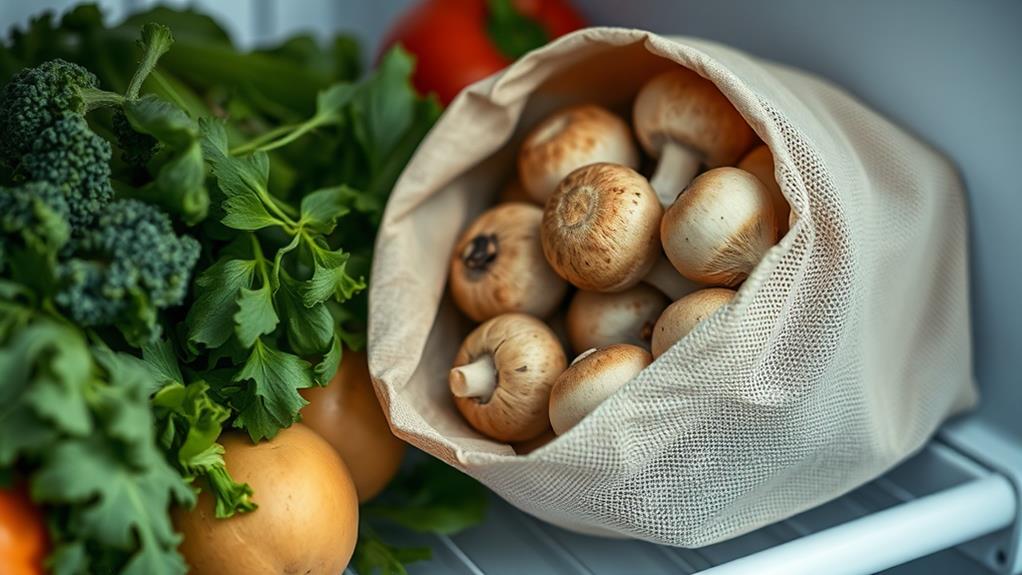
When it comes to storing mushrooms, you'll want to prioritize their freshness and flavor. Proper storage is key to avoiding spoilage and maintaining their delicious taste. Here are three essential tips to keep your mushrooms in tip-top shape:
- Use the Original Packaging: Store mushrooms in their original packaging or a paper bag. This helps maintain airflow and prevents moisture buildup, which can lead to spoilage.
- Avoid Washing Before Storage: Don't wash your mushrooms before storing them. Excess moisture promotes decay, so clean them just before you're ready to use them.
- Keep Away from Strong Odors: Store your mushrooms away from strong-smelling foods in the refrigerator. Their porous nature means they can easily absorb odors, which can affect their flavor.
Remember to use your mushrooms within one week of purchase for peak freshness. If you notice any signs of spoilage, like sliminess or a strong odor, discard them immediately to prevent the spread of decay to other stored items.
Following these tips will help you enjoy your mushrooms at their best!
Alternative Methods for Onion Preservation
Onions are a staple in many kitchens, and knowing how to preserve them can save you time and reduce waste. For cut onions, storing them in airtight containers or tightly sealed bags in the fridge keeps them fresh for up to 7-10 days while minimizing odor. You can also wrap cut onions in plastic wrap before placing them in a container; this helps further reduce odor escape and maintain moisture.
If you're looking for a more long-term solution, freezing chopped onions is a great option. This method can extend their shelf life to several months, ensuring you have them ready for future cooking without the risk of spoilage. When freezing, consider using glass jars to store the chopped onions. They not only help contain odors but also allow for easy visibility and access when you need them.
For short-term storage, try keeping cut onions cut-side down on a plate. This simple trick minimizes exposure and can help reduce the release of those pungent odors.
With these alternative methods, you'll keep your cut onions fresh and flavorful, making your cooking experience even better!
Conclusion
By following these frugal tips, you can keep your cut onions and veggies fresh longer while saving money. For instance, imagine you've diced a bunch of onions for a weeknight stew. Instead of letting the extras go to waste, you store them in a recycled glass jar with a lid. Not only do they stay fresh, but you also eliminate odors in your fridge. By being mindful of storage, you reduce waste and enjoy your ingredients to the fullest!

